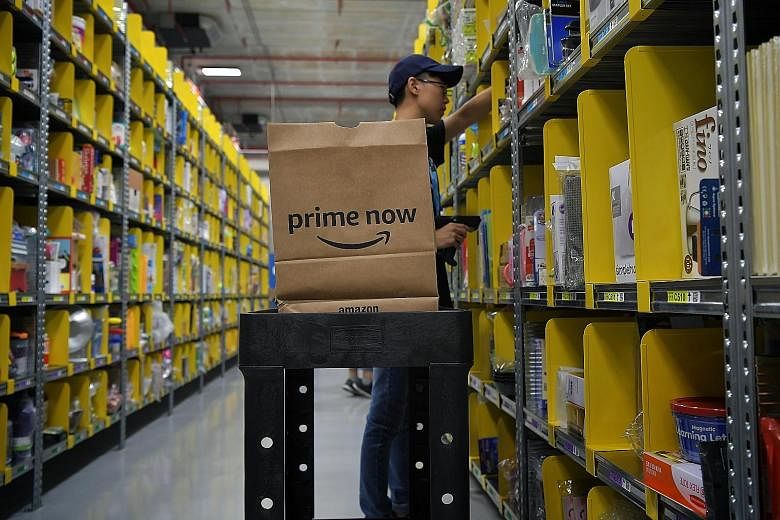Customers should not count on a protracted price war being sparked by Amazon's introduction of its Prime Now service in Singapore last month, say experts.
Prime Now is the American retail giant's much vaunted fast delivery service, with a stated turnaround time of two hours. But recent difficulties in placing and receiving Prime Now orders within two hours have underscored logistical challenges here.
Still, Prime Now's debut could push other retailers to focus on delivery time and other ways to stand out from the crowd, they add.
E-commerce companies must also decide whether they want to adopt a retail model, where they hawk their own wares, or a marketplace model, where they serve as a platform for third-party vendors.
Last year, a report from Google and state investment firm Temasek Holdings put the value of Singapore's e-commerce market at $1 billion that year, or 2.1 per cent of all retail spend. The Government has set an ambitious target of 10 per cent of all retail receipts by 2020 - well ahead of the Google- Temasek report's projections, which anticipated Singapore's e-commerce retail share growing to just 6.7 per cent by 2025.
Right now, large global retailers active here include Chinese giant Alibaba, which owns Taobao and lately drove up its stake in Singapore-based Lazada from 51 per cent to 83 per cent. Other online players operate in specialised segments - such as groceries, where RedMart was bought by Lazada just last year; fashion, with Zalora one big name; or food delivery, where operators include Deliveroo and UberEats.
Visa country manager for Singapore and Brunei Ooi Huey Tyng notes: "There is significant transformation in the service model, especially for transportation, meal delivery and groceries delivery."
Associate Professor Lewis Lim, of Nanyang Technological University's Nanyang Business School, thinks that Amazon's decision to swoop in on the household goods front was a savvy specialisation.
"If you think about the market of this particular category, it's very established in Singapore," he says, pointing to how supermarket chains such as FairPrice have already ventured online. But he cautions "they have perhaps over- promised with the Prime Now service", given the backlog of orders that almost immediately ensued.
"Having made the promise of a two-hour delivery, the first priority for them would be and should be to try to meet their standard now," says Prof Lim, who studies competitive marketing behaviour.
He adds that, whether or not Amazon succeeds in living up to its two-hour delivery schtick, it has already created "new market expectations on the part of the consumers".
And if Amazon gets it right, the convenience of fast deliveries can also make up for prices that are not the lowest, Prof Lim notes.
Economist Jochen Krauss, a managing partner at international pricing consultancy Simon-Kucher & Partners, agrees that prices may not be eroded, even with Amazon Prime Now in town.
"A lot of companies don't want to do that, but they somehow actively or by chance come into a price war mode where they think they can drive purchase or volume by lowering prices, and many times it actually doesn't play out," he says.
"It is because of the concentrated retail space… the density, the concentration of that space, sometimes drives players to do crazy things with regard to promotions."
Prof Lim and Dr Krauss both note the appeal of being a "time player". Similarly, Lazada Singapore chief executive Alexis Lanternier tells The Straits Times: "There is growing interest in our 'Express' channel, where products are delivered within the same day of ordering." The turnaround is "thanks to our partnerships with established, home-grown logistics partners SingPost and Ninja Van".
Logistics, in fact, may be the biggest challenge in Singapore, says Mr Luc Andreani, managing director of Foodpanda Singapore, who joined in June after previously serving as Lazada's chief marketplace officer.
He says "our customers don't care so much if they get the food in 30 minutes, versus 25", but, with only so many delivery riders, it is much harder for his business to shave off those five minutes.
"We have more than 2,500 riders," says Mr Andreani. "Rider supply is indeed the greatest challenge in Singapore as all riders are freelancers, and therefore very liquid."
He adds: "Here, it's more of an optimisation game, rather than an expansion game."
As the e-commerce landscape matures, companies could turn to innovative models to meet customers' needs. For example, Dr Krauss suggests, grocery retailers could have air-conditioned pick-up points at transport hubs like MRT stations - a service already tested in overseas markets such as the American capital Washington, DC - or tap local convenience stores' facilities to stash products awaiting collection.
Foodpanda's Mr Andreani adds that at his company, "we are working on opening what we call satellite kitchens… that we will rent and sub-rent to specific vendors which will focus only on delivery".
As the Government pushes to expose local retailers to a bustling e-commerce market, one possible future could see local small and medium-sized enterprises roped into the big boys' supply chains.
Mr Lanternier puts his modus operandi this way: "Lazada's success is fuelled by our expanding network of e-commerce partners: local sellers, third-party logistic vendors, suppliers, SMEs and like- minded partners."


